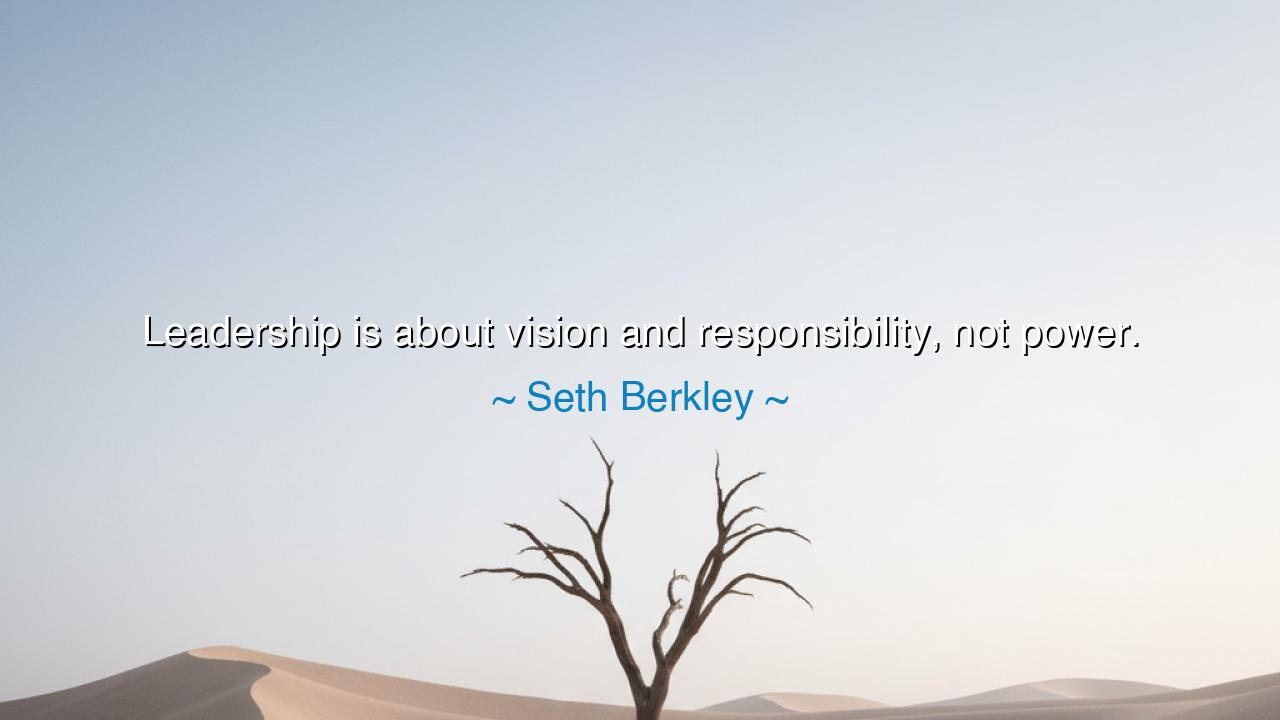
Leadership is about vision and responsibility, not power.






Hear, O children of wisdom, the voice of Seth Berkley, who proclaimed: “Leadership is about vision and responsibility, not power.” In these words is the essence of true command, the sacred heart of guidance that separates the shepherd from the tyrant. For too many throughout history have mistaken leadership for domination, imagining that to rule is to possess, to command, to bend others beneath their will. Yet Berkley teaches us: the greatness of a leader does not lie in how much authority he holds, but in how clearly he sees the road ahead, and how faithfully he bears the weight of those who follow him.
The first pillar of true leadership is vision. Without vision, a leader is blind, stumbling through shadows, unable to inspire or direct. Vision is the fire of foresight, the dream of what could be, the image of a better tomorrow etched upon the leader’s heart. Moses had no throne, no army of conquest, yet he had a vision of a Promised Land, and that vision sustained his people through wilderness and despair. Vision gives direction to effort, meaning to sacrifice, and hope to endurance. Without it, leadership decays into empty rule.
The second pillar is responsibility. To lead is to bear the burdens of many, to answer not only for oneself but for the fates of others. Responsibility is heavier than a crown of gold, for it demands sacrifice, integrity, and the willingness to suffer for the good of the people. Consider Marcus Aurelius, the philosopher-king of Rome. Though surrounded by wealth and absolute power, he did not revel in privilege. Instead, he carried the heavy responsibility of empire with humility, striving for justice and wisdom. His greatness was not in his might, but in the weight he bore for others.
Yet Berkley warns us of what leadership is not. It is not power—not the raw capacity to compel obedience, nor the ability to enforce one’s will. Power without vision corrupts, and power without responsibility destroys. History is filled with rulers who pursued power for its own sake: Nero, who burned Rome while playing his lyre; dictators who enslaved nations to feed their egos. Their reigns were fierce but fleeting, for they mistook domination for leadership. The ashes of their empires testify to the emptiness of power untempered by vision and responsibility.
True leadership, therefore, is a covenant, not a conquest. It is the sacred agreement between leader and people: “I will guide you toward a brighter tomorrow, and I will bear the weight of your struggles as my own.” Such leadership does not enslave—it liberates. It does not demand adoration—it inspires loyalty. It does not hoard privilege—it multiplies hope. This is why the memory of leaders who embraced vision and responsibility endures long after their power has passed into dust.
What lesson, then, must you take, O listeners of this age? It is this: if you are called to lead, seek first your vision, and let it be pure, not selfish. Then embrace your responsibility, and carry it with courage, even when the load is heavy. Do not seek leadership for the pleasures of control, but for the honor of service. And if you follow, test your leaders not by their power, but by the clarity of their vision and the strength of their responsibility. For these are the true measures of greatness.
Therefore, let your practice be this: cultivate a vision for your life, for your family, for your community. Take responsibility for your actions and for the well-being of those entrusted to you. Shun the temptation of power for its own sake, for it is a mirage that vanishes in time. Instead, walk the path of the servant-leader: with eyes fixed on what is excellent, and shoulders ready to bear the weight of many. And remember always Berkley’s eternal truth: leadership is about vision and responsibility, not power.






AAdministratorAdministrator
Welcome, honored guests. Please leave a comment, we will respond soon